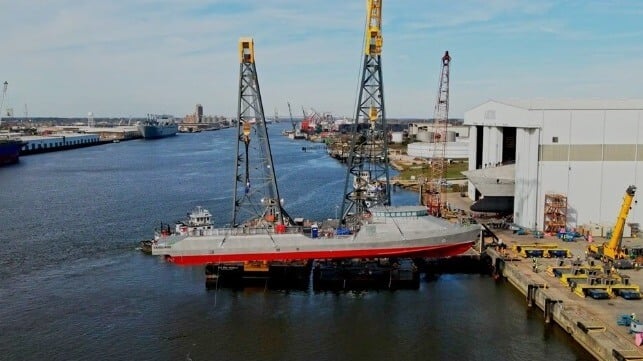U.S. Navy Christens its First Fully Purpose-Built "Overlord" USV

The U.S. Navy has christened the third unmanned surface vessel in its "Overlord" program, taking another step towards building its fleet of seagoing USVs.
The "OUSV" design is a testbed platform for the Navy's future unmanned surface warfare plans. The vessels have been used to test-launch containerized missile systems, and have taken part in multiple long-distance deployments and fleet-level exercises.
The latest addition is named Vanguard, the Navy said in an announcement. Unlike the last boat, Mariner, Vanguard was built at Austal's yard in Mobile, Alabama. It is the first in the series with a purpose-built hull design; the others were repurposed hulls (or hull forms) from commercial crewboats.
"The state-of-the-art technology she will employ is revolutionary and will be at the forefront of establishing new standards for our fleet," US Navy Unmanned Maritime Systems Manager Capt. Scot Searles said. "We are thrilled to achieve this important milestone and are looking forward to Vanguard leading the way as she enhances our nation’s naval power and strategic capabilities."

that matters most
Get the latest maritime news delivered to your inbox daily.
The program appears to fit the mold for the Pentagon's future plans, as laid out in the Replicator program: low cost, unmanned, straightforward to produce en masse. However, defense contractors who trade in this space expect that - despite all the publicity - the legacy shipbuilding giants who dominate the U.S. Navy orderbook will continue to outcompete the new technology for funding. At present, the manned procurement budget outweighs unmanned by a factor of 600:1. Part of the challenge is that few sailors know how to use the technology at the deckplate level, so there is less demand for it from the fleet. Another substantial part is simply politics.
"At some point, you hit the D.C. problem," Philipp Stratmann, CEO at Ocean Power Technologies (OPT), told Reuters. "You hit the fact that there is a military industrial complex that has the best lobbyists and knows exactly how the money flows and contracting works in the DOD."
